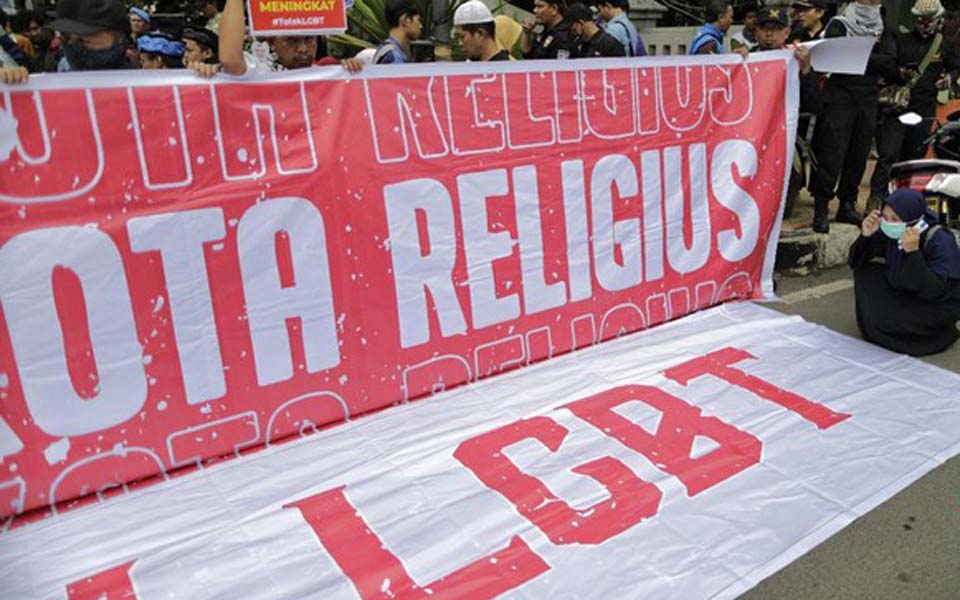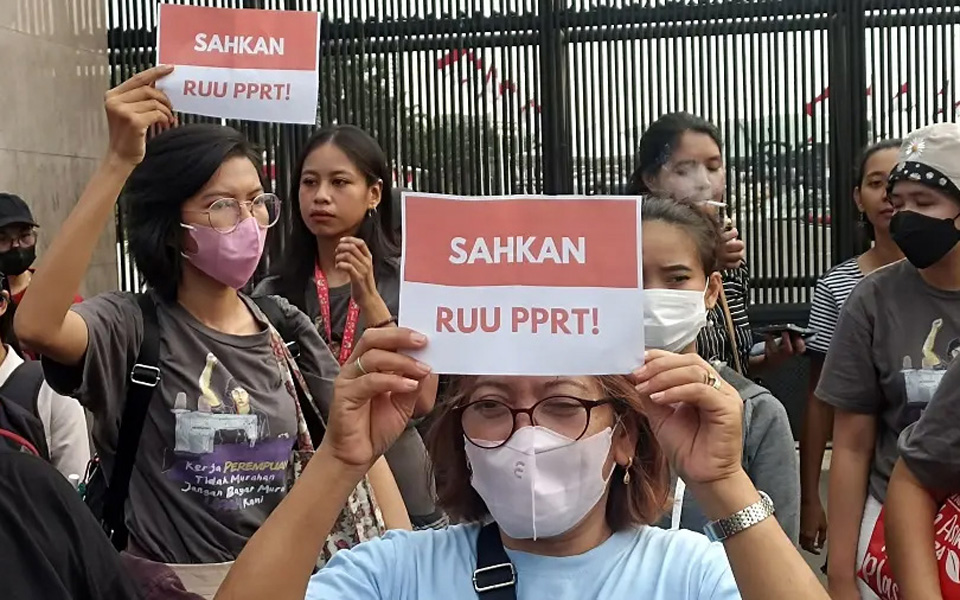The 2019 Jakarta Women’s March will be held on Saturday April 27 with the slogan #BeraniBersuara (ReadyToSpeakOut). This year, the action will be held close to Kartini Day – making the birthday of turn-of-the-century feminist hero Kartini – which is commemorated on April 21 each year. This year’s Women’s March will be articulating at least 10 demands.
Reportedly there will be more than 50 non-government organisations (LSM) and communities involved in the march. They will include, among others, Amnesty International Indonesia (AI), the gay rights group Rainbow Current (Arus Pelangi), the Women’s Institute, the National Network for Domestic Workers Advocacy (Jala PRT), the Indonesian Women’s Coalition (KPI), the Community of Migrant Workers (KABAR BUMI), the women’s advocacy group Kapal Perempuan, the Women’s Legal Aid Foundation (LBH APIK), the Nusantara Customary Community Women’s Alliance (Perempuan AMAN) and the Trade Union Rights Centre.
In addition to this, the 2019 Women’s March will not just be held in Jakarta but in 24 other cities across Indonesia including Lampung and Medan in North Sumatra, Bandung and Cirebon in West Java, Malang and Surabaya in East Java, Manado in North Sumatra, Bali, Ternate in North Maluku, Yogyakarta in Central Java, Indramayu and Serang in West Java, Pontianak in West Kalimantan and Blitar in East Java.
“Last year there were 15 cities, this year there are 25 cities, so there are 10 new cities which will take part in organising 2019 Women’s March actions. Certainly this is progress which is very clearly visible”, Vivi Restuviani told Asumsi.co following a 2019 Jakarta Women’s March press conference at the National Commission on Violence Against Women (Komnas Perempuan) offices in Jakarta on Thursday April 25.
Restuviani said that there as many as 2,000 people took part in the Jakarta Women’s March last year. She hopes that the numbers will increase this year.
“Last year there were around 2,000 participants that took part in Jakarta, this year we’re expecting that the participants should be more than last year”, she said.
Better organised
Not only that, according to Restuviani the volunteers involved in planning the Jakarta Women’s March this year are better organised and not just from LSMs.
“All of them originate from civil society circles, not just from LSMs, yeah, but there are also individuals who work in offices, students, even many SMA [senior high school students] have become our volunteers”, she said.
“Our expectations of the participants, well actually we have higher expectations of the individuals who will take to the streets, is to demand their rights. Including [the rights of] or women friends and other minority groups”.
Related to the organisation of the Women’s March, it will take place in late April in order to avoid the politicalisation surrounding the April 17 presidential and legislative elections which have just finished. It is also being organised after the elections for the safety and comfort of participants.
In addition to this, holding the march in late April means it will also celebrate Kartini Day which is commemorated on April 21 each year. And so that Kartini Day will not just celebrate traditional clothing and cooking skills.
“We want to retake the original meaning of Kartini Day. We want to celebrate Kartini as a one of the most important figures in Indonesian history and remember her contribution to the struggle for women’s rights, and not just talking about the issue of her kebaya”, said Restuviani referring to a traditional long-sleeved blouse warn over a sarong.
10 demands
First, calling for the ratification of all draft laws which support the eradication of violence, discrimination, stigma and repression against women in different sectors. Second, abolishing and or reforming discriminative regulations and laws.
Third, ensuring that the village and fishing laws accommodate the needs of women in a way that is inclusive, participatory and environmentally friendly. Fourth, ensuring that the implementation of the Law on the Protection of Migrant Workers sides with women migrant workers and eliminates the crime of human trafficking and exploitation.
The fifth demand meanwhile is putting an end to and investigating all violations of human rights and criminalisation against women, marginal groups and minorities. The sixth demand is establishing a law enforcement system that is gender fair.
The seventh demand is calling for development that mainstreams comprehensive and inclusive gender justice, including improving all infrastructure and transport services so that they are friendly towards women, children and other marginal groups.
Eighth, increasing women’s political representation and demanding that the political parties carry out the function of political and citizenship education with a gender perspective.
The ninth demand is pushing for an education curriculum which is comprehensive, gender fair and inclusive, including education on mental health, sexual health and reproduction.
The final demand is to ensure the implementation of social protection which is comprehensive, gender fair and inclusive, including guarantees and access to healthcare services.
Women’s March
The Women’s March itself is a collective of organisations from a variety of backgrounds which have come together to articulate the rights of women, marginal and minority groups.
The Jakarta Women’s March meanwhile is a movement pioneered by the Jakarta Feminist Discussion Group (JFDG) which held its first march on March 4, 2017 involving around 800 people followed by a May 3, 2918 march which involved around 2,000 people.
The 2019 Jakarta Women’s March itself will begin at 7am on Saturday April 27. For anyone interested in taking part they can gather in front of the Sari Pacific Hotel in Central Jakarta. The march will end at the Aspiration Park at the National Monument in the centre of the city.
[Translated by James Balowski. Sub-headings were added during translation. The original title of the article was “Women’s March Jakarta 2019 Menyuarakan 10 Tuntutan Terkait Keadilan untuk Perempuan”.]















